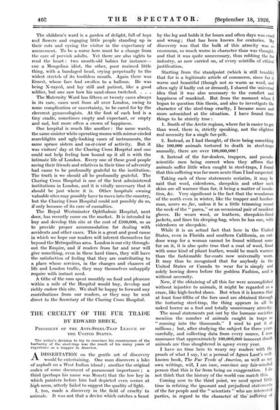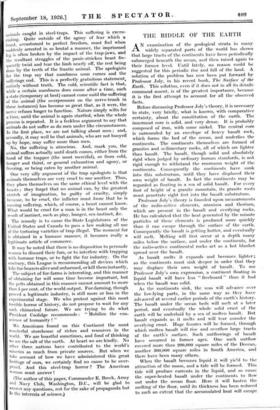THE CRUELTY OF THE FUR TRADE
BY EDWARD BRECK, PRESIDENT OF THE ANTI-STEEL-TRAP LEAGUE OF THE UNITED STATES.
The writer's decision to try to convince his countrymen of the barbarity of the steel-trap was the result of his many years of experience as a trapper in America.
ADISSERTATION on the gentle art of discovery would be entertaining. One man discovers a lake of asphalt on a West Indian island ; another the original codex of some docuinent of paramount importance ; a third (perhaps his name was Monet) that the low key in which painters before him had depicted even scenes at high noon, utterly failed to suggest the quality of light. too,_ made a . discoVery in the field of cruelty to animals. It was not that a device Which catches a beast by the leg and holds it for hours and often days was cruel and wrong ; that has been known for centuries. my discovery was that the bulk of this atrocity was so enormous, so much worse in character than was thought, and that it was quite unnecessary, thus robbing the fur industry, as now carried on, of every scintilla of ethical justification.
Starting from the standpoint (which is still tenable) that fur is a legitimate article of commerce, since fur is warm and beautiful (though not so warm as wool, and often ugly if badly cut or dressed), I shared the universal idea that it was also necessary to the comfort and happiness of mankind. But from the moment when I began to question this thesis, and also to investigate the character of the steel-trap cruelty, I became more and more astonished at the situation. I have found three things to be strictly true : 1. South of the Arctic regions, where fur is easier to get than wool, there is, strictly speaking, not the slightest real necessity for a single fur-pelt.
2. Instead, as I had thought, of there being something like 100,000 animals tortured to death in steel-traps annually, there are over 100,000,000 !
3. Instead of the fur-dealers, trappers, and pseudo. scientific men being correct when they affirm that animals suffer little when caught in steel-traps, I found that this suffering was far more acute than I had suspected. Taking each of these statements seriatim, it may be said that wool, eiderdown, sheepskin and other such skins are all warmer than fur, it being a matter of insula- tion, &c. Very significant is the fact that the woodsman of the north even in winter, like the trapper and lumber.
man, wears no fur, unless it be a little trimming round the neck of the " pares," or an occasional pair of muskrat gloves. He wears wool, or leathern, sheepskin-lined jackets, and lines his sleeping-bag, when he has one, with eiderdown or sheepskin.
While it is an actual fact that here in the United States, even in Florida and southern California, an out- door wrap for a woman cannot be found without some fur on it, it is also quite true that a coat of wool, lined with some kind of pliant leather, would be much warmer than the fashionable fur-coats now universally worn. It may thus be recognized that for anybody in the United States or Canada to wear fur is simply and solely bowing down before the goddess Fashion, and is without necessity.
Now, if the obtaining of all this fur were accomplished without injustice to animals, it might be regarded as a craze, like high-heeled shoes. But when it is known that at least four-fifths of the furs used are obtained through the torturing steel-trap, the thing appears in all its naked horror as a foul and totally unnecessary atrocity.
The usual statements put out by the humane societies mention the number of animals caught in traps as " running into the thousands." I used to put it at millions ; but, after studying the subject for three years carefully, and collecting data from every Source, mow announce that approxiniately 100,006,000 innocent dumb animals are thus slaughtered in agony every year. I have no time here to weary ny. readeri' with the proofs of what I say, tut a perusal of Agnes Laut's well- knoWn book, The Fur Trade of America, as well as my own wiitings, will, I am sure, convince any fair-minded person that this is far from being an exaggeration. I do not think that the history of the world can match this. Coming now to the third point, we need spend little time in refnting the ignorant and prejudiced statements of the fur people and the " scientists " whO are interested parties, in regard to the character of the' suffering of animals caught in steel-traps. This suffering is excru- ciating. Quite outside of the agony of fear which_ a beast, accustomed to perfect freedom, must feel when suddenly arrested in so brutal a manner, the imprisoned kg is often broken by the impact of the trap-jaws, and the resultant struggles of the panic-stricken beast fre- quently twist and tear the limb nearly off, the rest being done by the teeth of the frantic animal. The apologists for the trap say that numbness soon comes and the sufferings_ end. This is a perfectlygratuitous statement, entirely without truth. The cold, scientific fact is that, while a certain numbness does ensue after a time, such a state (temporary at best) cannot come until the suffering of the. animal (the overpressure on the nerve-trunk in these instances) has become so great that, as it were, the nerve refuses longer, to function. Niture simply wilts for a time, until the animal is again startled, when the whole process is repeated. It is a feckless argument to say that animals do not suffer as do men under like circumstances. In the first place, we are not talking about men ; and, secondly, it may well be that animals, who are not buoyed up by hope, may suffer more than men.
No, the suffering is atrocious. And, mark you, the animal suffers actually until death comes, either from the hand of the trapper (the most merciful), or from cold, hunger and thirst, or general exhaustion and agony, or freezing, or being eaten by another animal.
One very silly argument of the trap apologists is that animals themselves are very cruel to one another. Thus, they place themselves on the same ethical level with the beasts ; they forget that no animal can, by the greatest stretch of imagination, be guilty of cruelty, simply because, to be cruel, the inflicter must know that he is causing suffering, which, of course, a beast cannot know. Illat would be cruel for a man is in the beast only the result of instinct, such as play, hunger, sex-instinct, &c.
The remedy is to cause the State Legislatures of the rnited States and Canada to pass a law making all use of the torturing varieties of trap illegal. The moment fur is obtained in a humane manner, it becomes really a legitimate article of commerce.
It may be noted that there is no disposition to persuade women to discard their furs, or to interfere with trapping with humane traps, or to fight the fur industry. On the Contrary, this League is recommending all devices which take fur-bearers alive and unharmed, or kill them instantly.
The subject of fur-farms is interesting, and this manner of obtaining fur will some time become important, but the pelts obtained in this manner cannot amount to more than 5 per cent. of the world output. Fur-farming, though proved a legitimate industry, is still more or less in the experimental stage. We who protest against this most terrible horror of history, do not propose to wait for any such chimerical future. We arc trying to do what President Coolidge recommends : " Mobilize the con- science of humanity ! "
We Americans found on this Continent the most wonderful storehouse of riches and resources in the world. We are boastful sometimes, and fond of thinking we are the salt of the earth. At heart we are kindly. No other three_ nations have contributed to the world's miseries as much from private sources. But when we take account of how we have administered this great heritage of ours, we certainly find no cause to be over- proud. And this steel-trap horror ? The American woman must answer !
(The author of this paper, Commander E. Breck, Army and Navy Club, Washington, D.C., will be .glad to answer any questions, not for the sake of propaganda but In the interests of science.)































































 Previous page
Previous page